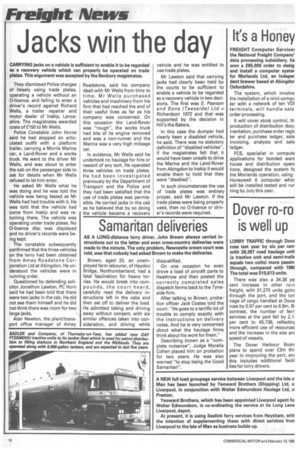Jacks win the day
Page 8

If you've noticed an error in this article please click here to report it so we can fix it.
CARRYING jacks on a vehicle is sufficient to enable it to be regarded as a recovery vehicle which can properly be operated on trade plates. This argument was accepted by the Banbury magistrates.
They dismissed Police charges of falsely using trade plates, operating a vehicle without an 0-licence, and failing to enter a driver's record against Richard Wells, a trailer repairer and motor dealer of lnskip, Lancashire. The magistrates awarded costs of f 150 to Mr Wells.
Police Constable John Horne said he had stopped an articulated outfit with a platform trailer, carrying a Morris Marina car, a Land-Rover and a works truck. He went to the driver Mr Wells, and was about to enter the cab on the passenger side to ask for details when Mr Wells refused to let him enter.
He asked Mr Wells what he was doing and he was told the vehicle was being tested as Mr Wells had had trouble with it. He was told that the vehicle had come from Inskip and was returning there. The vehicle was operating under trade plates. No 0-licence disc was displayed and no driver's records were being kept.
The constable subsequently confirmed that the three vehicles on the lorry had been obtained from Amey Roadstone Corporation Ltd at Abingdon. He understood the vehicles were in running order.
Questioned by defending solicitor Jonathon Lawton, PC Horn said he had been told that there were two jacks in the cab. He did not see them himself and he did not think there was room for two large jacks.
Alan Newton, the plant/transport office manager of Amey Roadstone, said his company dealt with Mr Wells from time to time. Mr Wells purchased vehicles and machinery from his firm that had reached the end of their useful lives as far as his company was concerned. On this occasion the Land-Rover was "rough", the works truck had bits of its engine removed and was a non-runner and the Marina was a very high mileage car.
In evidence, Mr Wells said he undertook no haulage for hire or reward of any sort. He operated three vehicles on trade plates. He had been investigated previously by the Department of Transport and the Police and they had been satisfied that the use of trade plates was permissible. He carried jacks in the cab as he believed that by so doing the vehicle became a recovery vehicle and he was entitled to use trade plates.
Mr Lawton said that carrying jacks had clearly been held by the courts to be sufficient to enable a vehicle to be regarded as a recovery vehicle in two decisions. The first was E. Pearson and Sons (Teesside) Ltd v Richardson 1972 and that was supported by the decision in Hill's the Bakers.
In this case the dumper had clearly been a disabled vehicle, he said. There was no statutory definition of "disabled vehicles". If the magistrates felt that it would have been unsafe to drive the Marina and the Land-Rover from Abingdon to Inskip it would enable them to hold that they were "disabled".
In such circumstances the use of trade plates was entirely proper, said Mr Lawton. If the trade plates were being properly used, then no 0-licence or driver's records were required.
















































